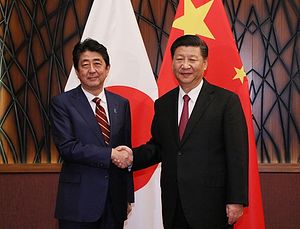China and Japan have made conspicuous moves to improve their long-strained relations in recent months. However, the warming of ties is best seen as a “tactical detente” that may not be durable, according to Dr. Giulio Pugliese, a lecturer in war studies at King’s College London specializing in Asia-Pacific politics.
At a professional luncheon in Tokyo this week, he said this detente was being driven by friction between the United States and China. Beijing felt time was on its side when it came to the fundamentals of its growing power, Pugliese said, adding that Japanese Prime Minister Shinzo Abe also needed a diplomatic success story before he faced the ruling party leadership vote later this year. But a number of factors could cause strain down the track.
China and Japan resumed a high-level economic dialogue in April after an eight-year hiatus. Traveling to Tokyo for the dialogue, China’s State Councilor and Foreign Minister Wang Yi found common ground with Japanese counterpart Taro Kono on the importance of opposing trade protectionism. Then, in May, Abe welcomed Chinese Premier Li Keqiang and South Korean President Moon Jae-in to Tokyo for the first trilateral leaders’ summit in two-and-a-half years. During a subsequent bilateral meeting, Abe and Li agreed on a date to launch Japan and China’s maritime and aerial communication mechanism, a long-awaited channel for avoiding clashes in the East China Sea.
Pugliese, co-author of the book Sino-Japanese Power Politics: Might, Money and Minds, said China had recently made it clear that it wanted to engage with Japan. “China has hastened its embrace of Japan,” he told reporters at the event on July 3. “We are experiencing this now because China-U.S. relations are changing.”
The lecturer said there was growing consensus in the United States, not just within the Trump administration but also among Democrats, that a tougher line should be taken toward China. He cited mounting frictions in Washington-Beijing relations regarding the South China Sea, Taiwan, and trade: “This is the driver of China’s charm offensive, not just vis-a-vis Japan, but also vis-a-vis India, vis-a-vis South Korea. But we need to wait and see. This is a tactical detente; China knows that time is on its side.”
Abe is considered likely to visit China fairly soon, paving the way for a reciprocal visit by Chinese President Xi Jinping in time for next year’s G20 summit to be hosted by Japan. On the fringes of the G20, Pugliese said, it was likely that the two leaders would “showcase to the world a fifth key document governing Japan-China relations.”
Although such a document would include a series of lofty principles, it would also need a key deliverable to showcase that Japan-China relations were back on track. Pugliese said it was his understanding that the best way to do that was a certain level of cooperation on Xi’s flagship Belt and Road Initiative (BRI).
Japan has previously spelled out various conditions for participation in BRI projects. Kono said in April that Tokyo “could consider cooperation case-by-case for projects that firmly match the standards that are being established internationally, namely taking into consideration international standards and transparency, openness, the soundness of the project and the fiscal soundness of the country accepting the financing, and environmental and social factors.”
In that vein, Pugliese said Japan was likely to “push for specific projects involving Japan-China joint ventures, or Japan-China private corporations, operating in a third country – Southeast Asia, for instance – on a project that showcases the sustainable and technologically advanced and energy-efficient part of Japanese development exports.”
Asked for his assessment of how long the detente would be sustained, he said it depended largely on the state of relations between Washington and Beijing. If such ties remained contentious, China was likely to continue its charm offensive. Pugliese added: “It might be possible that Japan gets embroiled in a Taiwan crisis of some sort, even if it’s a pro forma one and not a military crisis in a narrow sense, or in the South China Sea. But I don’t see this happening yet.”
Ultimately, according to Pugliese, “the signals are quite good for the moment, not least because Abe needs a diplomatic success story, even if it’s a semblance of a diplomatic success story, to win the [Liberal Democratic Party] presidential elections in September, and to eventually win new elections to confirm his mandate and the LDP’s mandate in the Diet. So I think that domestic politics also plays a role in keeping up momentum for this semblance of detente between Japan and China.”

































